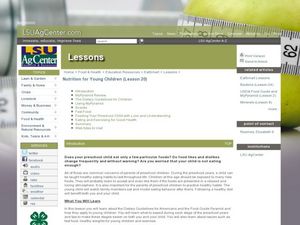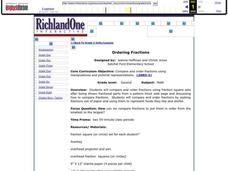Curated OER
Breakfast of Champions
Second graders classify foods using the food pyramid and write about the foods they eat. They distinguish between healthy and junk food and make healthy choices for their meals. They listen to the story "No Peas for Nellie" and discuss...
Curated OER
Key to Good Health #1: Nutrition
Young scholars learn tips for healthy eating. In this nutrition lesson, students learn about the four main food groups, view a food pyramid, and get tips on how to get the most nutrition out of their meals. Young scholars also learning...
Curated OER
Day Three: Reading menus; writing letters
Learners practice English vocabulary in menus and food items. In this ELL lesson, students look at pictures of people eating and describe what they are doing. They talk about the food that they like and dislike and describe why.
Curated OER
Carmaleetas
Young scholars identify the relationship between predator and prey in the food chain. For this food chain lesson, students work in groups and play a predator and prey game. Young scholars discover what happens when a predator does not...
Curated OER
Cooking In Britain Today
For this international foods worksheet, students complete activities and exercises on ten pages that pertain to typical dishes in different countries with an emphasis on British food. This is intended for ESL students.
Curated OER
What Is It? Tommy Tastes
Students complete multi-curricular to learn about senses and sensory words. In this sensory words lesson, students discuss the five senses and the anatomy of a tongue. Students complete a food tasting activity and find descriptive words...
Curated OER
Amazing Adjectives
Fourth graders compose sentences that use descriptive adjectives to describe a specific food and day that they both like and dislike. They should really enjoy coming up with words that describe their favorite and least favorite foods!
Curated OER
ADULT ESOL LESSON PLAN--Effective Interpersonal Communication
Students explore various ways to express likes, dislikes, feelings, and emotions when communicating between people. They model these ways via pictures of food, weather, music, sports, cars, etc.
Curated OER
Nutrition for Young Children
Students examine the dietary guidelines for young children. In this healthy diet lesson students examine the issues surrounding the children's diets.
Curated OER
Tasters' Choice
Pupils taste foods, some of which are familiar foods and some of which are uncommon foods. They compare and contrast the tastes and graph their likes and dislikes.
Curated OER
Venn Diagram
Students use a Venn diagram to show students' likes and dislikes of eggs and ham.
Curated OER
Similar and Different
Fourth graders observe a pair of students standing in front of the class and compare and contrast them using a Venn Diagram using these guidelines: eye color, hair color, older/younger, tallest/shortest, gender, favorite food, favorite...
Curated OER
Recipe Formats - Level II
A recipe, no matter its format, gives ingredients and instructions for a specific food so that the food item tastes the same every time. See Preface Materials:
Curated OER
Backyard Wildlife Conservation
Students survey local wildlife. They distinguish between permanent and migrating or seasonal species. Students identify species and describe the ecological niche. Students research the food chain and food web for the backyard...
Curated OER
Sense of Taste and the Tongue
Young scholars taste different foods and record their reaction to each one. They record their likes, dislikes, and favorites and create a graph. Then they use the graph to compare the tastes of the class.
Curated OER
Intermediate Synonyms and Antonyms #9
In this synonyms and antonyms activity, students choose the best synonym for the first 6 words and the best antonym for the next 6 words.
Teach-nology
Author’s Purpose: Persuade
Explore author's purpose with an activity about persuasive arguments. After reading a short passage about Spain, learners identify three main passages that the author uses to persuade the reader.
Curated OER
Immigration Unit
Third graders develop an appreciate for the various cultures that are present in their local community. Through reading and research, they explain how various culture came to live in their area. At the conclusion of the unit, 3rd...
Curated OER
Cruzin' to the Arctic
Students, in groups, study life in the Arctic Region and connect their own life experiences to the experiences of students in the Arctic.
Curated OER
Charlotte's Web
Fourth graders focus on fluency by reading the book Charlotte's Web. In this reading strategies instructional activity, 4th graders partner read, do guided reading, and independent reading to increase fluency. Students use Venn Diagrams,...
Curated OER
Use Your Nose
Students explore how their senses work. In this senses lesson, students use the sense of smell to observe various spices. Students discuss their findings.
Curated OER
Ordering Fractions
Second graders use shapes to create various fractions. In this fractions lesson, 2nd graders define a fraction, visit a website where they make fractions using various shapes, and use a fraction square set to create and name fractions.
Pearson
Non-Action Verbs
A verb is something you do — but can you always see the action? Use a slideshow presentation to clarify the differences between verbs that describe actions, and verbs that describe senses, preferences, and emotions.
Federal Trade Commission
Ad Creation
How would someone market a new cereal to space aliens? Using the third lesson from a four-part Admongo series on advertising, pupils learn about persuasive techniques companies use to convince consumers to purchase their products. As a...

























